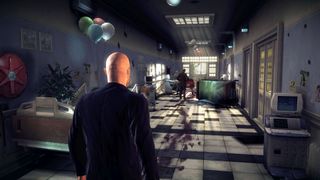Why Hitman Absolution isn't as bad as you remember


Reinstall invites you to join us in revisiting PC gaming days gone by. Today, Andy argues the case for Hitman Absolution.
Our review was brutal. Tom Francis rightly criticised the long-awaited sequel for being a step backwards from the magnificent Blood Money. Expectations were high, and Io Interactive delivered a game too obsessed with story and scripted set-pieces to provide the assassination sandbox we wanted.
Despite this, I’ve always had a soft spot for it. It’s a rubbish Hitman game, sure, but it’s an enjoyable 15-hour chunk of mostly good action-stealth, with a few missions I think are among the best in the series. When a new Hitman graced the cover of our August issue, I decided to reinstall Absolution to see if time has been kinder to it.
The biggest mistake Io made was thinking its story was any good, and making that the focus of the game. It’s horribly written, and tries hopelessly to humanise Agent 47. A lot of developers fall into this trap, thinking we care about their characters as much as they do. Imagining they require depth and complexity, when, really, they’re just a means to an end. It’s not Lara Croft the character who defines the Tomb Raider games: it’s what she does. Similarly, no one really cares about Agent 47 as a person. He’s an excuse to pull off amazingly cool assassinations. That’s it.

This increased focus on story means that between the proper Hitman-style contracts, of which there are a few, you’re forced to play through clunky, badly designed scripted events, including a woeful rooftop chase involving a helicopter. I’m not sure why Io thought the game needed these. They are everything a Hitman game shouldn’t be: linear, scripted, action-packed, and railroading you into a single playing style. There was a six-year gap between Blood Money and Absolution, and in that time, Io appeared to forget why people fell in love with its games in the first place.
Another glaring flaw is the structure. Unlike the huge, open-ended missions of Blood Money, Absolution’s levels are, criminally, split into chunks. There are loading breaks as you transition between areas, and it auto-saves. The lack of any manual save system whatsoever means if you want to experiment, you have to repeat entire chunks of the mission—and in a game where guards like to have massive conversations before they start their patrol, this is an exercise in frustration. And again, it displays a baffling lack of understanding about why we loved the other games.
And, yet, I still think it’s a decent game. I’m someone who has always appreciated strong world-building, and Io’s artists are some of the best in the business. Absolution is an astonishingly pretty game, set in a cluttered, believably lived-in world. They went overboard with the bloom lighting, to the point where it sometimes looks like the aftermath of a nuclear explosion, but the amount of detail squeezed into the levels is mad. The Terminus hotel is straight out of David Fincher’s Seven: a grimy, dilapidated building, populated by lowlifes and pounded by rain. Hope is an archetypal dusty American desert town, its streets lined with stars-and-stripes bunting.

These amazing spaces make for some genuinely brilliant missions, with a similar freeform feel to those of Blood Money—albeit hampered by the stupid auto-save system and the levels being split into chunks. There are loads of ways to infiltrate the Terminus. Hope is similarly stuffed with options. A mission in a strip club involves you using a massive crowd of hooting horny men to wander around unseen, planning your hit. There are moments where it feels like classic Hitman, and these, I think, are just about worth all those rooftop chases, sniping sections, and other lame set-pieces.
PC Gamer Newsletter
Sign up to get the best content of the week, and great gaming deals, as picked by the editors.
If you keep comparing Absolution to Blood Money you’ll have a terrible time, but take it as it is and there’s a lot of fun to be had. If Blood Money is 2001: A Space Odyssey, then Absolution is 2010: The Year We Make Contact. Inferior in almost every respect, but an enjoyable continuation of the series regardless. The problem is, for every standout moment there’s a massive sinkhole of awful waiting to swallow you up. It’s probably the most inconsistent game I’ve ever played in terms of quality.
One of the main plot threads involves Agent 47 protecting a 14-year-old girl called Victoria, but because the writing is so messy, it’s hard to care about her at all. You don’t feel the same drive and urgency he apparently does, which weakens the narrative massively. The story becomes little more than a distraction, getting in the way of the reason for playing a Hitman game: hitting men. The new incarnation shown off at E3 seems to be sidelining story in favour of good old-fashioned murder sandboxes, thank God.

Phil thinks Absolution should never be absolved.
“Nice try, Andy, but a Hitman game with a helicopter chase sequence is indefensible. As is a Hitman game that, at the end of your mission, triggers a cutscene in which Agent 47 fails to kill his target. Absolution does both, and deserves to be filed away in your Steam Library under a special category called ‘the bin’.”
Absolution is a peculiar quality dip in an otherwise brilliant series. I’m not sure why it happened, but I have a theory. Io used Absolution to show off its new Glacier 2 engine, and I get the feeling it was still finding its feet with the tech. It had the visuals nailed. I mean, just look at those environments. But perhaps it had problems making levels as big and seamless as Blood Money’s. And perhaps this impacted the game design too, forcing the studio to cut corners. That’s total conjecture, but I’ve seen similar things happen in other games. Assassin’s Creed III was the debut of Ubi’s AnvilNext engine, and was similarly hamstrung as a result. Both games, in fact, take the power away from you at the last moment and play some of their assassinations out in cutscenes, rather than giving you control over them. That should never happen.
But even with its flaws, and a lukewarm critical reception, Hitman: Absolution still sold almost 4 million copies. Its Metacritic score currently sits at a respectable 79. Even though many hardcore Hitman fans (including our own Tom Francis) lamented its inferiority to its predecessors, it seems the brand was strong enough to ensure people still bought it. Which is for the best, because if it was a total failure, we might never have seen another Hitman game. It’s been around for years, but there’s still a lot of potential in the series—for more complex simulation, more freedom, and more ways to creatively kill people. Hopefully we’ll see some of that in the new game, titled simply Hitman: with luck, that’s an indication of its back-to-basics approach.
If it’s set in space, Andy will probably write about it. He loves sci-fi, adventure games, taking screenshots, Twin Peaks, weird sims, Alien: Isolation, and anything with a good story.
Most Popular


